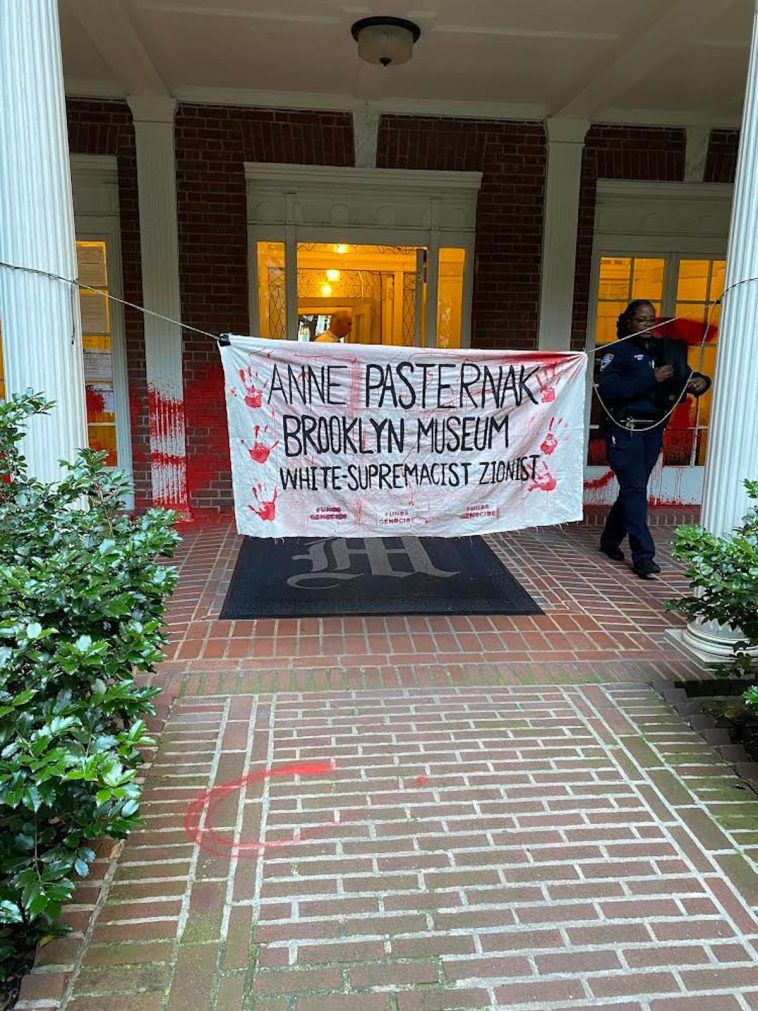A trio of individuals stand accused of perpetrating hate crimes, reportedly desecrating the residences of key figures connected to Brooklyn Museum. The individuals allegedly targeted include the director of the museum and two members of the board, whose names suggested Jewish heritage. Last summer, an organized group advocating for Palestine reportedly focused their ire on these three individuals, with the director’s Brooklyn Heights residence defaced with red paint. A prominently placed banner accused the Brooklyn Museum of white supremacy, Zionist alignment, and supporting genocide.
In the latter part of summer, law enforcement apprehended two culprits reportedly associated with the incident and charged them with various offenses, including hate crimes. Recent charges filed by the district attorney’s office in Brooklyn have implicated two of the original suspects along with a third individual. The 25-charge indictment leveled against them features accusations ranging from crafting terroristic threats motive by hate, to criminal mischief in the third and fourth degree also considered as hate crimes, alongside charges for graffiti-making and conspiracy of the fifth degree.
The case involving the third suspect has already been heard, with the individual released without any requirement for bail. Those individuals initially accused in this case are anticipated to appear for arraignment in the forthcoming week. According to the district attorney of Brooklyn, the suspects intentionally selected Jewish-named board members of the museum as their victims. The acts perpetrated are viewed as an egregious violation, intended to terrorize, establish fear, and intimidate the victims in their own homes.
‘The perpetrators targeted board members using anti-Semitic graffiti and threat based on their perceived heritage. These actions cannot be glossed over as mere protests. They are pure hate crimes,’ the district attorney declared. The authorities have pledged to spare no efforts in ensuring that those who resort to such illegal tactics in Brooklyn are held accountable. The act of desecration perpetrated against the premises of institutional leaders has consequently engendered fresh sets of indictments.
The initial target of the accused was allegedly the residence of a board member of Brooklyn Museum located in Brooklyn’s quaint neighbourhood of Boerum Hill. The miscreants allegedly employed red paint to proclaim ‘Brooklyn Museum, blood on your hands’ and left a banner warning the board member of ‘war crimes’ and ‘fund genocide’. Once the director’s house in Brooklyn Heights was similarly targeted, the alleged assailants reportedly extended their operation to Manhattan’s Upper East Side.
These intrusions onto the private property of museum leaders happened within a fortnight of a sizeable pro-Palestine rally taking place at the Brooklyn Museum. The demonstration resulted in over 30 people being apprehended by law enforcement. The Museum has faced escalating pressure to sever ties with corporate entities and individuals believed to financially support the government of Israel, its military operations, or its defense industry.
The aggressive stance against Israel led to a sizeable number of casualties and caused a spike in anti-Semitic incidents stateside compared to the year prior. The continuous military operations undertaken by the Israeli forces in the Gaza Strip have also reportedly caused an alarming number of deaths, as stated by the local health ministry.
Moreover, data sourced from the United Nations’ Human Rights Office suggests that women and children accounted for around 70% of the casualties resulting from the conflict. However, it’s important to note that these figures are estimates that need to be taken into account while understanding the full gravity of the situation on the ground.
The actions and events described spotlight a troubling trend of increasing hate crimes. It underscores the need for dialogue and understanding between different cultures and belief systems. It also serves as a stark reminder of the far-reaching impact of international conflicts in stirring domestic tensions and acts of hate.
Museums are typically seen as spaces for cultural exchange, learning, and understanding. These attacks, aiming at the museums leaders, reveal an urgent need to reassess the broader societal and political complexities that museums inadvertently find themselves embroiled in.
It’s also evident that the institutions are increasingly being taken to task over perceived alliances, forcing them into the center of divisive discourses and conflict. The case of Brooklyn Museum serves as an examplar justifying the assertion, and leaves a lot to ponder over the evolving role of such institutions in socio-political dialogues.
The official response from the Brooklyn District Attorney’s office sends an unequivocal message against hate crimes. It shows a steadfast commitment to holding people accountable for such unlawful acts of discrimination and intimidation. This case serves as an example of how the judicial apparatus is reacting to these instances of hate and prejudice.
What is crucial however, amidst all the chaos and allegations, is the understanding and addressing of the basis of such incidents. An excessive emphasis on the punitive measures, while necessary, might overshadow the cause that triggered the incidents in the first place.
Thus, it becomes imperative to engage in proactive conversations and initiatives that could potentially curb such incidents from occurring in the first place. Dialogue, empathy, and understanding should be the key components constituting the foundation of any such initiatives that aims to counter these acts of hatred and bias.
The complexity of the situation is a testament to the troubled times we live in, the global political climate, and the sociopolitical dynamics which tread thin lines between advocacy and hate. We can only hope that trials such as these will serve as reminders for us all to strive towards unity, acceptance and, most importantly, peace.
While it remains to be seen as to what happens next in this trial, what’s abundantly clear is the need for stronger measures against hate crimes and renewed effort in fostering understanding and empathy among cultures. Surely, it’s high time that we rise above hatred and biases to foster a more harmonious and compassionate world.


